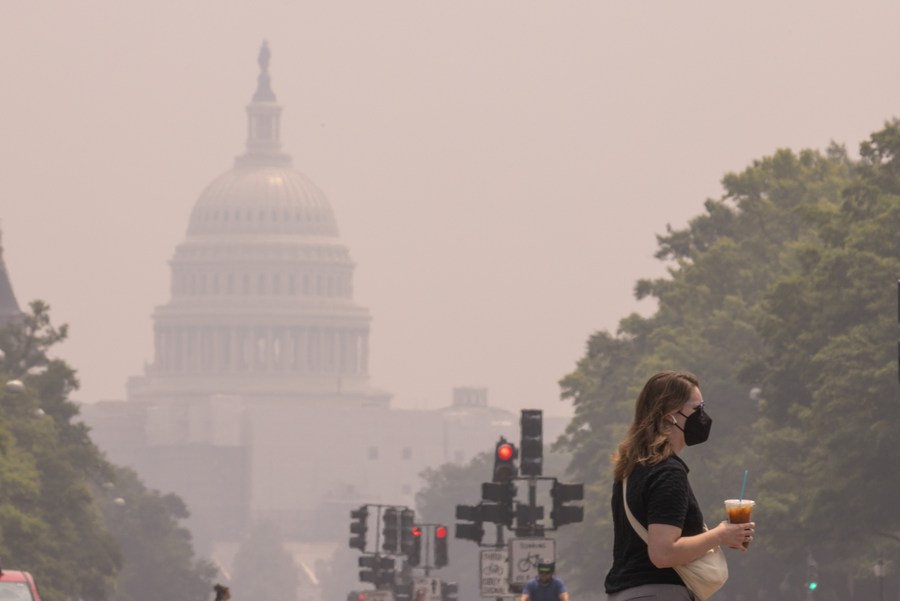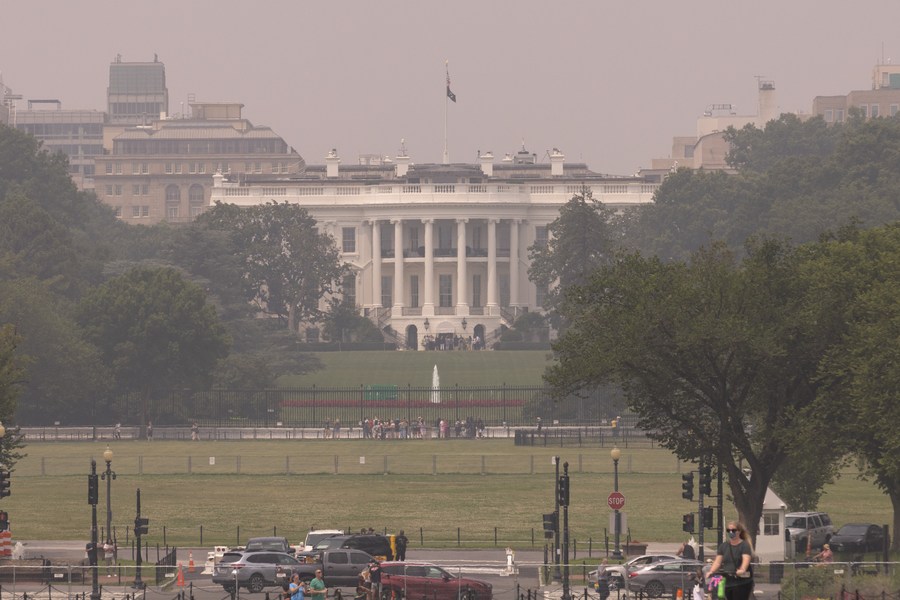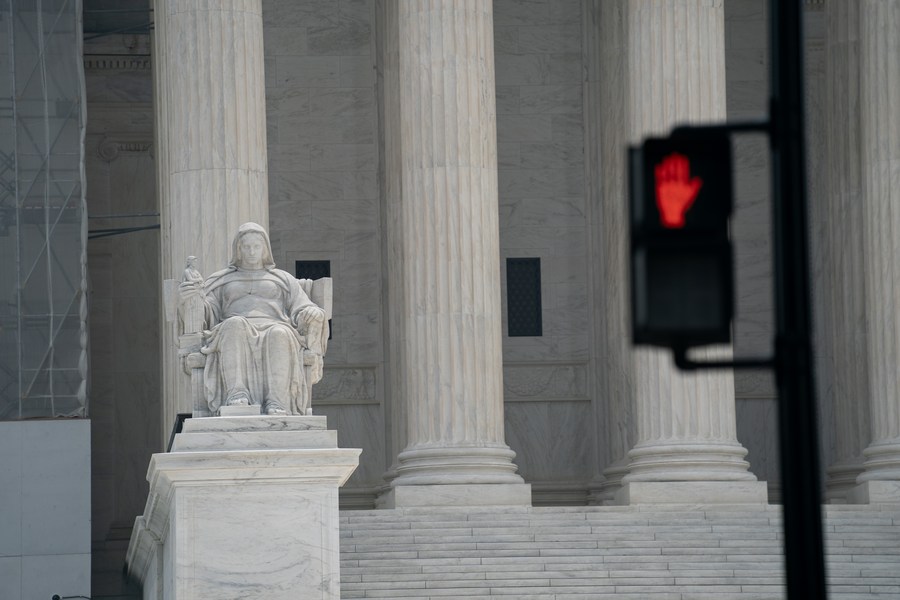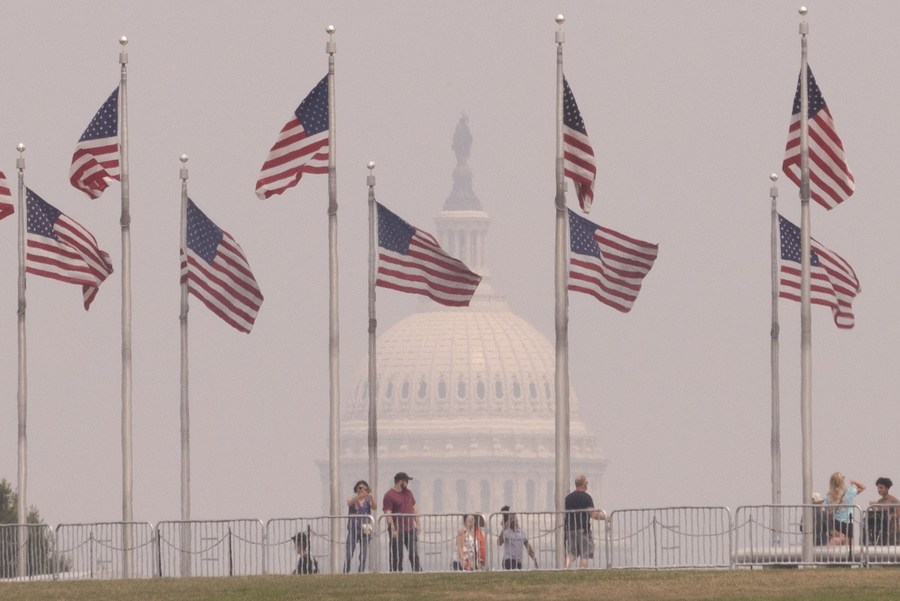
A pedestrian wearing a face mask is seen with the U.S. Capitol building shrouded in haze in the background in Washington, D.C., the United States, on June 29, 2023. (Photo by Aaron Schwartz/Xinhua)
It is important to stay lucid and recognize that given the various challenges in China-U.S. relations, a significant detente is not a business that can be undertaken in a day or swiftly achieved by a mere command of the will.
by Xinhua writer Gao Wencheng
BEIJING, July 8 (Xinhua) -- China-U.S. interactions have lately forged ahead and hence some common understandings, signifying positive development towards a detente between the world's two largest economies.
Yet, it is important to stay lucid and recognize that given the various challenges in China-U.S. relations, a significant detente is not a business that can be undertaken in a day or swiftly achieved by a mere command of the will.
Their political, economic as well as people-to-people exchanges have sunk to their nadir in decades, owing largely to the major misconceptions in America's China policy and its consequential moves.
To stabilize and improve China-U.S. relations, the first and foremost prerequisite lies in Washington's will to shift its perception of China and adopt a rational approach to China's rise.
The very essence of today's problems lies in the misjudgment of China by some U.S. politicians, and notably the bigoted bias against China harbored by Washington's China hawks. China endeavors to develop its economy to enable all Chinese to live a better life, rather than to threaten, challenge, or supplant any other countries.
Framing China as a "threat" based on the unfounded fear of China competing for hegemony is utterly brainless, while deeming China as an imaginary enemy is a typical case of groundless anxiety.

The White House is shrouded in haze in Washington, D.C., the United States, on June 29, 2023. (Photo by Aaron Schwartz/Xinhua)
Washington also lacks adequate understanding of the resilience of the Chinese people. It is nothing but an illusion for the United States to deal with China "from a position of strength," as China has never subscribed to the logic of "might makes right." Any attempt to suppress China will only evoke a more resolute response from the Chinese people.
Second, to mend fences between the two sides, consensus between the two heads of state during the G20 summit in Bali should be genuinely implemented.
The exchange of views between the two heads of state in Indonesia has charted the course to steer the relationship back to a healthy and stable track.
However, over the last few months, the United States has run counter to the spirit advocated by the consensus, taking a slew of actions detrimental to China's core interests, severely damaging the political foundation for the China-U.S. ties, polluting the environment for bilateral exchanges, and disrupting the agreed-upon dialogue and cooperation agenda.
Implementing the Bali consensus entails adhering to the principles of mutual respect, peaceful coexistence, and win-win cooperation.
For China and the United States, respecting each other's development rights, properly managing the source of tensions, along with embracing cooperation rather than confrontation can ensure the steady and long-term development of their relations.

Photo taken on June 29, 2023 shows the U.S. Supreme Court in Washington, D.C., the United States. (Xinhua/Liu Jie)
Third, both sides must respect each other's core interests and major concerns, refrain from treading on each other's bottom lines, and manage differences and sensitive issues in a constructive, calm, professional, and rational manner.
Particularly, the Taiwan question, which stands out at the very core of China's core interests, is the bedrock of the political foundation of China-U.S. relations and the first red line that must not be crossed in China-U.S. relations. On this question, China has no room for compromise.
On other sensitive topics, China has made it clear that the specific differences between the two sides can be patched up through discussion, but only on the precondition of equality.
For instance, the two countries take different paths in their respective national development: the United States practices capitalism while China adopts socialism. Such difference has been there since day one of the China-U.S. engagement and will continue to exist.
For China and the United States to get along, it is vital to recognize and respect such differences. Washington's so-called "democracy vs. authoritarianism" narrative is an outdated awful fuss.
Fourth, improving the relationship with China constitutes a responsibility that the United States should undertake towards the world.
History has proven that China and the United States, when in concert, can accomplish much to both countries and the world. They joined forces in 2001 to combat terrorism, cooperated in 2008 to address the international financial crisis, and in 2016, played a crucial role in reaching the Paris Agreement on climate change.

People are seen with the U.S. Capitol building shrouded in haze in the background in Washington, D.C., the United States, on June 29, 2023. (Photo by Aaron Schwartz/Xinhua)
However, after Washington's China policy has been dominated by misconceived competition, its attempts to contain China, through wars on the fronts of trade, industry and technology, have taken a toll on not only the development of the two sides but also that of the wider world. The international community expects both sides to approach each other with a sense of responsibility, properly handle their differences, and find the right way to get along.
In the future, there is great potential for their cooperation on a host of bilateral and global issues if Washington ditches its increasingly confrontational posture toward China.
Fifth, Washington's attempt to contain China is destined to fall flat.
China is bound to develop steadily because of its unique institutional advantages such as the whole-process people's democracy, a reliable and effective system fitted to China's realities. Its unstoppable progress also comes from its more than 1.4 billion industrious and intelligent people.
Meanwhile, China actively integrates into the trend of the times, and shares prosperity and promotes peace with other countries. This is the historical logic of China's development and the root cause of China's increased influence. In the era of globalization, countries have interconnected interests. That's why most countries are reluctant to take sides, let alone be tied onto the chariot of confronting China.
Washington's China approach underpinned by competition and confrontation has neither held China back nor made America great again, only to arouse resentment from across the world. Abandoning it now is a sensible move.






